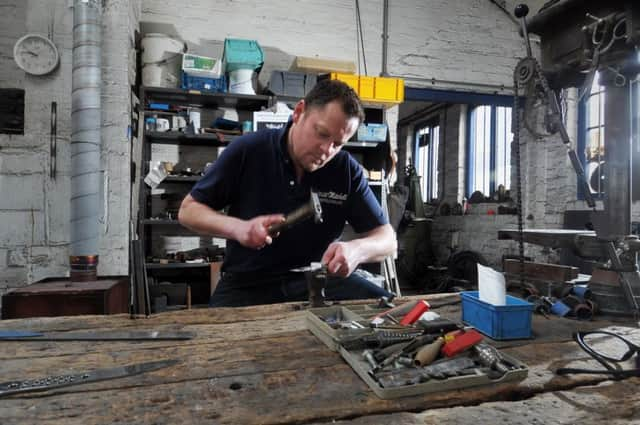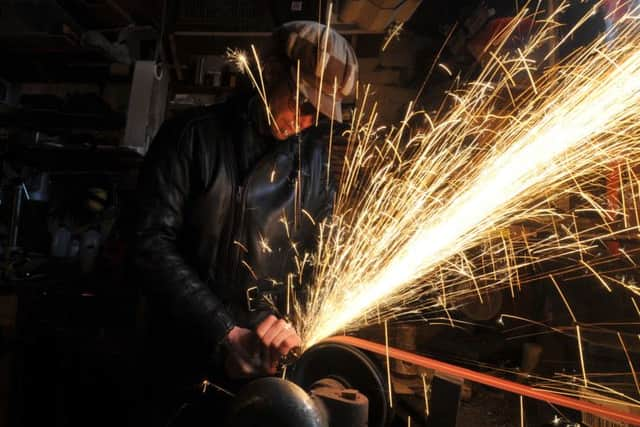Reviving Sheffield's traditional art of knife making


More on the woolly mammal after meeting members of another species that seemed threatened with extinction a few years ago... the knife makers of Sheffield. The industry dates back to the 14th century and has taken the city’s name around the world, but its craftsmen have dwindled over the decades and the future was looking bleak. Now, however, there’s a revival – and much of it is due to the internet: the latest technology coming to the rescue of some of the oldest.
In their inner-city workshops near Sheffield United’s Bramall Lane ground, Stuart Mitchell and Will Ferraby have very different approaches to knife-making. But one thing unites them – their enthusiasm for online marketing.
Advertisement
Hide AdAdvertisement
Hide Ad“The internet is the most powerful tool I’ve ever had in this workshop,” says Stuart. “When you’re doing what I’m doing, you’ve got to reach a worldwide audience. And the internet is my window on the world.”


Just round the corner, Will Ferraby, who features in a new series of YouTube films with celebrity chef Michel Roux Jr, agrees. “If it wasn’t for the internet, I wouldn’t be able to do this,” he says. “Someone said to me: ‘You know, Will, this marketing stuff is a waste of time. If you produce a good knife, people will get to know about it.’ I said that was complete b......s. I’m not necessarily just selling knives on my website; I’m selling myself as a designer.”
Thanks to the internet, both craftsmen have customers all over the world. “I sell to explorers and expedition leaders,” says Stuart. “I get photographs of people using my knives to hack through the jungle or cut ropes on Mont Blanc.”
Internet trading was hardly on the horizon when I first met him more than 20 years ago. In those days he was Stuart Mitchell junior, working with his father (Stuart senior) in a no-frills workshop with whitewashed walls and grimy machinery.
Advertisement
Hide AdAdvertisement
Hide AdIt took some finding in Portland Works, a former Victorian factory curving round a street corner. Across a cobbled yard and up teetering stone steps, the Mitchells were hard at work and keen not to consign themselves to history – or its living death, “heritage”.


You’ve got to adapt and diversify, said Stuart senior, with a smile like sunshine and a handshake like a pair of pliers. The knife industry couldn’t afford to rest on its laurels – not always a common view in a city where pride in quality work could become a stubborn resistance to change. Steeped in the knife industry, Stuart junior, who has inherited his father’s smile and handshake, had known the workshop since he was eight or nine and started working there full-time at 15. He had a massive setback three years after we met, however, when his father died unexpectedly.
“It was a tough time,” he says, still in the same workshop today. “My dad taught me everything but never gave me a formal lesson. It was the only thing I knew how to do. I spent a couple of months sat in here with the lights off, coming to terms with it.”
He rallied and expanded the company, taking on four staff and making blades for London jewellers, swords, knives of all sorts. “But I found I was spending more and more time in an office and became disillusioned. So I closed the company, locked the doors and left the workshop, mothballed it.”
Advertisement
Hide AdAdvertisement
Hide AdHe took on other work, but didn’t enjoy it and after a year relaunched the company – that’s to say himself – creating knives, many for collectors and costing from £250 to £1,000. Kitchen knives, steak knives, chef’s knives, outdoor knives. “I make custom knives,” he boldly announces on his website. “I can make your knife.”
He put the first one he made on eBay, sold it, and realised that the internet was his future. “The whole landscape of the market has changed because of the internet,” he says. “You’ve got knife forums, people who are educated about knives and are willing to pay a bit more for them.”
Now, he says, he ships knives abroad every week. He emails production photographs to customers so they can follow their knife’s progress. “Some come and visit,” he says. “I pick them up at the station and we have a cup of coffee and a bacon sandwich and they love being involved in it.”
And the strip of woolly mammoth tusk? Intended for a knife handle and imported from a supplier in Hong Kong.
Advertisement
Hide AdAdvertisement
Hide AdDown the next street, Sheffield United’s main stand looms over Will Ferraby’s workshop: the Blades across the road from the blades. He shares it with his assistant Fran Barkworth and it’s tiny, about 14ft by 10ft, and crammed with bits of wood and drawers stuffed with things that may come in useful.
Will is the subject of the first film in Michel Roux Jr’s The Craftsmen’s Dinner, a six-part YouTube series of short films made in collaboration with The Balvenie whisky company and exploring the idea of craftsmanship.
The word often implies skills passed down – as with the Mitchells – from generation to generation, but not with Will Ferraby. Born in Ripon and growing up in the North Yorkshire countryside, he came to Sheffield Hallam University to study environmental conservation.
Afterwards, he taught survival skills, but found “I was spending more than half my time in front of a computer, and I’m not at home in an office.” So he started making kitchen knives, reviving an interest aged nine), and set up his workshop.
Advertisement
Hide AdAdvertisement
Hide AdWe retreat to the larger space of a nearby cafe, where we’re surrounded by people ploughing their way through bacon sandwiches, clearly the staple diet of the Sheffield knife industry.
“The first three years were very hard work, a mixture of teaching myself and gleaning what I could from people in the knife trade,” says Will. “Anyone can make a knife, but making a successful knife business takes a considerable amount more.”
More what? “Possibly vision, being willing to take risks, to do things differently to other people. First and foremost, a knife is a practical tool, but it also has to have a story. In some ways it’s linked to my own story, so there’s a little piece of me in every knife.”
He regards knife-making as an art, but describes himself as a craftsman – ideas which he explores on a film on his website. Thanks to his perfectionist approach, he says on it, his business “doesn’t necessarily produce millions of pounds, but it does produce a very high quality of life”.
Advertisement
Hide AdAdvertisement
Hide AdRoux’s researchers saw the film online, registered his easy manner when talking straight to camera and signed him up. Another career boost from the internet.
“What attracted me to knife making is that it’s an honest trade, an honest day’s work,” he says. “You’re not lying to anyone, pretending to be working. I want my knives to be used every day. Art without function is a bit pointless; function without art is a bit heartless.
“When I’ve finished a knife that’s the start of its journey. If I was making it for a collector, that would be the end of the journey, in a box.”
Selling for around £400, his knives keep up his environmental credentials, using sustainable woods (particularly olive), not woods from endangered tree species.
Advertisement
Hide AdAdvertisement
Hide AdInevitably the talk turns to “Little Mesters”, the Sheffield name for self-employed cutlery workers who hired out their very specific skills.
“In many ways ‘Little Mester’ sums up the idealistic Sheffield industry and the idea of individuality,” he says.
“It’s all very well people thinking about these Little Mesters churning away happily in their workshops, but that’s work, as opposed to what I do. I think the whole meaning of existence is to play. What I do is getting paid to play.”
stuartmitchellknives.com; ferrabyknives.co.uk
The Craftsmen’s Dinner film was released on March 15: www.youtube.com/TheCraftsmensDinner.